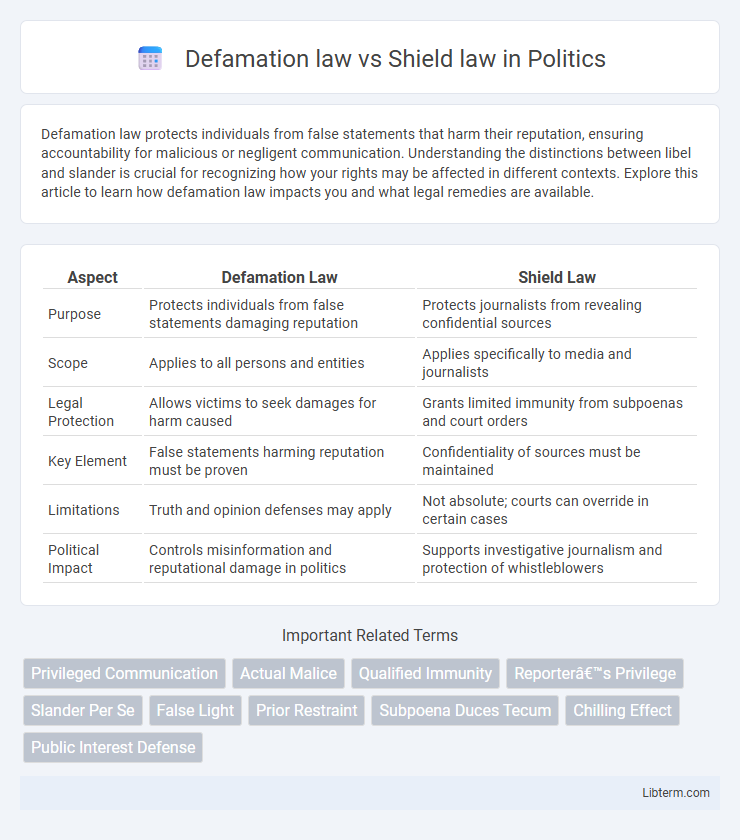Defamation law protects individuals from false statements that harm their reputation, ensuring accountability for malicious or negligent communication. Understanding the distinctions between libel and slander is crucial for recognizing how your rights may be affected in different contexts. Explore this article to learn how defamation law impacts you and what legal remedies are available.
Table of Comparison
| Aspect | Defamation Law | Shield Law |
|---|---|---|
| Purpose | Protects individuals from false statements damaging reputation | Protects journalists from revealing confidential sources |
| Scope | Applies to all persons and entities | Applies specifically to media and journalists |
| Legal Protection | Allows victims to seek damages for harm caused | Grants limited immunity from subpoenas and court orders |
| Key Element | False statements harming reputation must be proven | Confidentiality of sources must be maintained |
| Limitations | Truth and opinion defenses may apply | Not absolute; courts can override in certain cases |
| Political Impact | Controls misinformation and reputational damage in politics | Supports investigative journalism and protection of whistleblowers |
Understanding Defamation Law
Defamation law protects individuals and entities from false statements that harm their reputation, requiring the claimant to prove that the statement was false, defamatory, and made without adequate research into its truthfulness. Shield laws, on the other hand, provide legal protections for journalists and reporters, allowing them to refuse to disclose confidential sources or unpublished information during defamation cases. Understanding defamation law is crucial for distinguishing between protected free speech and defamatory statements that can result in legal liability.
Overview of Shield Law
Shield law provides legal protections for journalists, allowing them to refuse to disclose confidential sources or unpublished information in court. These laws vary by jurisdiction but are designed to safeguard press freedom and encourage investigative reporting without fear of government reprisal. Unlike defamation law, which addresses false statements harming an individual's reputation, shield laws specifically limit compelled disclosure to protect confidential communication in journalism.
Key Differences Between Defamation Law and Shield Law
Defamation law protects individuals from false statements that harm their reputation, requiring the injured party to prove the statement's falsity and resulting damage. Shield law provides legal protection for journalists by allowing them to refuse disclosure of confidential sources or unpublished information in court. The key difference lies in defamation law addressing harm caused by defamatory speech, while shield law safeguards press freedom by limiting compulsion to reveal journalistic materials.
Historical Development of Both Laws
Defamation law originated from English common law, evolving to balance protection of individual reputation against freedom of speech, with seminal cases like New York Times Co. v. Sullivan setting modern U.S. standards. Shield laws, first enacted in the 20th century, developed to protect journalists from revealing confidential sources, addressing the rise of investigative reporting and fostering press freedom. Both laws reflect ongoing tensions between safeguarding reputation and ensuring transparency and free expression in democratic societies.
Legal Protections for Journalists
Defamation law protects individuals from false statements that damage their reputation, requiring journalists to verify information before publication to avoid legal liability. Shield laws provide journalists with legal protections to refuse revealing confidential sources or unpublished information, enhancing press freedom and investigative reporting. Balancing these laws ensures accountability while safeguarding journalistic integrity and the public's right to accurate information.
Defamation Law: Proof and Burden
Defamation law requires the plaintiff to prove that the defendant made a false statement presented as fact, which caused harm to the plaintiff's reputation. The burden of proof lies with the plaintiff to establish that the statement was published to a third party, was defamatory, and lacked privilege or consent. Shield laws do not affect these requirements but primarily protect journalists from revealing confidential sources during defamation claims.
Shield Law: Scope and Limitations
Shield laws protect journalists from being compelled to disclose confidential sources or unpublished information during legal proceedings, enhancing press freedom and safeguarding investigative reporting. The scope of shield laws varies by jurisdiction, often covering protections for news reporters but excluding those engaged in illegal activities or non-journalistic entities. Limitations include the potential override of shield protections in cases involving national security, criminal investigations, or where the need for disclosure outweighs the public interest in confidentiality.
Impact on Freedom of Speech
Defamation law restricts freedom of speech by allowing individuals to seek legal recourse against false statements that damage their reputation, ensuring accountability but potentially chilling open discourse. Shield laws protect journalists from revealing confidential sources, reinforcing investigative reporting and safeguarding the flow of information vital to a democratic society. Balancing these laws impacts the extent to which freedom of expression is preserved while maintaining protections against harmful or malicious communications.
High-Profile Legal Cases
Defamation law protects individuals and entities against false statements that harm their reputation, resulting in high-profile legal cases such as the Johnny Depp vs. Amber Heard trial, where allegations and counterclaims emphasized the complexities of proving defamation. Shield laws safeguard journalists from being compelled to reveal confidential sources, a protection highlighted in landmark cases like Branzburg v. Hayes, which underscores the tension between press freedom and legal accountability. The interplay between defamation and shield laws often shapes courtroom strategies in cases involving public figures and media outlets, influencing outcomes and legal precedents.
Balancing Public Interest and Legal Rights
Defamation law protects individuals from false statements that harm reputations, while shield laws safeguard journalists from revealing confidential sources to promote press freedom. Balancing public interest involves ensuring that defamation claims do not suppress truthful reporting or whistleblowing, maintaining transparency and accountability. Legal rights are negotiated by courts to protect free speech without compromising individuals' reputations or privacy.
Defamation law Infographic

 libterm.com
libterm.com